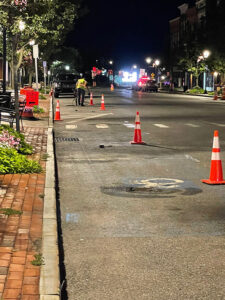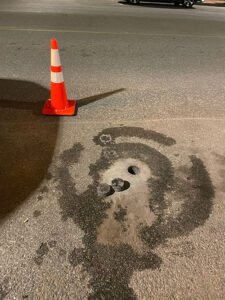By Cathy DeDe, Chronicle Managing Editor

The City of Glens Falls has installed sensors under 150 parking spaces on downtown streets, part of a Smart City Technologies Grant overseen by development director Jeff Flagg.
The sensors are on Warren, Glen and Ridge Streets in the first block out from the roundabout, and on South Street from Glen Street to School Street.
“It’s a pilot program,” Dr. Flagg tells The Chronicle. “It’s an enhancement for the public and more efficient for enforcement.”
The sensors — from a St. Louis-based tech company called Fybr — will work with an available “Park Smart” phone app that will help drivers find parking spaces.
For the City, Dr. Flagg said, “The real efficiency of the technology to parking enforcement will be in providing better data about who has been in what space for how long, rather than having the enforcement officer constantly chalk tires and then circle back to see whose tire have been chalked.
“Once a vehicle has exceeded its allowable time, the app will alert the officer…and the driver, too, if they have the app.”
Dr. Flagg said Glens Falls has been “flexible” about parking enforcement since the pandemic. He expects enforcement will be more vigilant, “now that President Biden said the pandemic is over, and we begin to reengage.”
Can the sensors be used to implement paid parking downtown, which Mayor Bill Collins has floated as a possibility?
Dr. Flagg said, “Although the technology does allow the option of incorporating paid parking into the sensors, the City has no current plans to use them as such, and is focused on using the technology to help people find desired parking spots and as a tool for better parking enforcement” of time limited use.
Dr. Flagg noted that the sensors don’t read license plates.
“The City Council has not weighed in, or even discussed, to my knowledge, the option of paid parking, and in fact specifically earmarked some of the grant to cover the networking costs…so that we could analyze the value of the technology without having to worry about paying for the ongoing costs of the sensors.”

Dr. Flagg said the sensors will also aid the City’s current parking study to determine needs and possible solutions, such as building a parking structure, adding to the one at the Travelers building, or building a transportation “Hub.”
Dr. Flagg said the sensors work even through a layer of snow. “They are flush to the road, and won’t interfere with snowplows. They’re used very successfully in Montreal and other places with snow.”
$225,000 project; sensors $9 each
Dr. Flagg said Glens Falls received a grant of $150,000 plus up to $300,000 in matching funds. He put the total project cost at $225,000, 80% through the grant and $37,500 from the City’s streetlight conversion budget.
The cost per sensor is $9, including the networking fee, data reporting, mobile wayfinding and enforcement apps, a warranty and any maintenance costs.
“The grant we received covers all of these costs for the first 5 years. Then, the hope is the system will begin to pay for itself through enhanced parking efficiency.
“Studies show that such a system can increase sales tax revenue by increasing traffic flow. Cars aren’t driving around looking for a space.”
Dr. Flagg said the app will launch when it is calibrated and personnel are trained.
Copyright © 2022 Lone Oak Publishing Co., Inc. All Rights Reserved
 Glens Falls Chronicle Serving the Glens Falls/Lake George region; Warren, Washington and northern Saratoga counties since 1980
Glens Falls Chronicle Serving the Glens Falls/Lake George region; Warren, Washington and northern Saratoga counties since 1980

